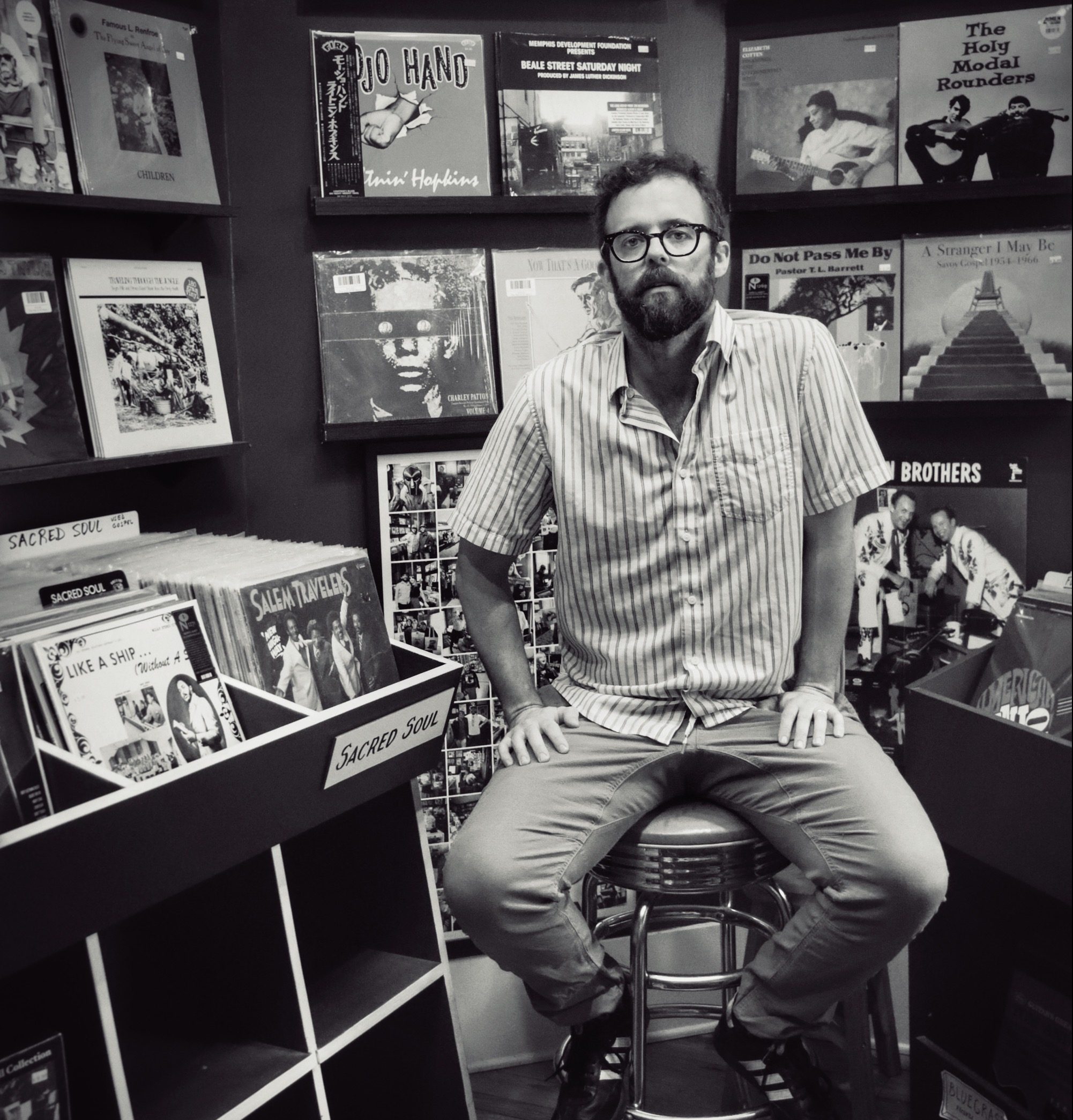Keely May
Faces of blues artists on the covers of vinyl records – Charlie Patton, Mississippi Fred McDowell – span the walls of a room at the End of All Music, Oxford’s record store.
Staffer Ben DuPriest sips coffee in the early morning at a small desk beneath those blues walls, telling stories about the music, and fans who travel to hear it.
DuPriest, who earned his doctorate in ethnomusicology at the University of Pennsylvania researching the blues, is dedicated to finding pathways for artists to express their freedom by looking at what threatens those freedoms – namely the music business, and a lack of financial support – and how it dampens creativity.
To understand any genre of popular music, DuPriest said, not just the blues, you have to come to terms with the forces which undermine creativity, and by extension, freedoms.
DuPriest found the blues in the Delta after moving to Mississippi in 2016 to begin his research, which also began a love affair with backroads and blues festivals. Along the way he gained insight into the harsher realities musicians faced.
His musical interests reach as far back as childhood. As a boy, attending church in Athens, Georgia, the voices of the church choir filled his imagination.
When he began to play the drums, and the sound of drumsticks clashing against his very first drum set filled the house. His father had played drums in high school and college. From elementary school band to middle school choir, music fueled him.
“Everyone had their thing, mine was music,” said DuPriest, as the early light filtered through a small window overlooking the Square, reflecting off a record on his desk, which sent the light dancing across the ceiling.
It marked the beginning of a journey that has taken DuPriest across the Delta exploring the truths and hidden inequities experienced by musicians, the differences between the reality musicians face and fan perceptions of the music.
Once, DuPriest walked into a small local blues spot in the Mississippi Delta, where a sound he couldn’t easily categorize was playing, a funk-jazz.
“Turn that mess off,” DuPriest recalled hearing the man sitting at the front desk yell back to what seemed to be his employees. They replaced it with traditional blues music, crackling through the speakers as DuPriest entered.
Later, DuPriest learned that this new music was not some type of funk-jazz. It was a new, greener branch of blues, he said. Most blues tourists wouldn’t recognize it.
Blues tourism creates a set of expectation that limits what gets heard, shared.
Also, scholars study this relationship of influence and perception, he said. DuPriest wants to support the musicians who do not pander. He seeks the real, not merely the traditional, and not some facade for the tourism industry.
“I don’t want these musicians to be pigeon-holed into a narrow framework that only defines their past and how we perceive the history of the music,” said DuPriest.
He glanced up to the records adorning the walls. Seemingly prompted by the faces of the greats surrounding the room, he began to explain the history of Delta Blues and its deep traditions. Still, this is not the only reality, he pointed out.
“We should always allow our understanding of musicians to be diverse with respect to musical style- not only valuing musicians who play in a traditional style,” said DuPriest. “The reality is that 90% of the time you’ll see a band, whether that be in Clarksdale or wherever, play a Prince cover or some kind of R&B or soul music.”
Too, DuPriest believes music across genres has become symbolically overvalued, suggesting racial progress when it’s not the reality. “The democratic value of music has become a little bit too common and over-emphasized in areas where there has really been very little progress,” said DuPriest.
DuPriest said that although music can be a great-democratizer, this is not always the case, and the perception of music has been skewed to place artists on pedestals.
It’s not fair to use these artists as a figurehead for social progress when they themselves are often disadvantaged by the relationship that capitalism has created between their music and its listeners, he said. Mississippi places cultural significance on music, but the reality is that these artists are barely making any money.
Capitalism makes the lives of artists difficult, he said. With so little funding available, it is hard for musicians to fully devote their time to music.
He does credit the Mississippi Arts Commission as they work to provide funding for artists in the state, and DuPriest said he is grateful to have worked with them to provide grants to musicians. Still, he believes there is work to be done. “It’s very hard to make enough money to make art in general,” he said.
He wants to uplift these musical artists by providing them with a voice, whether through his research or finding avenues for these artists to experience better financial support.
“It is important to recognize that artists will play in a traditional style, but they are also just as good at playing new music or music from the 60s, 70s, and 80s. Their interest in that is just as interesting to me.”
Keely May is a sophomore from Madison, Mississippi, studying both Public Policy Leadership and Integrated Marketing Communications at the University of Mississippi. In her free time, she enjoys reading, writing, and playing guitar.

